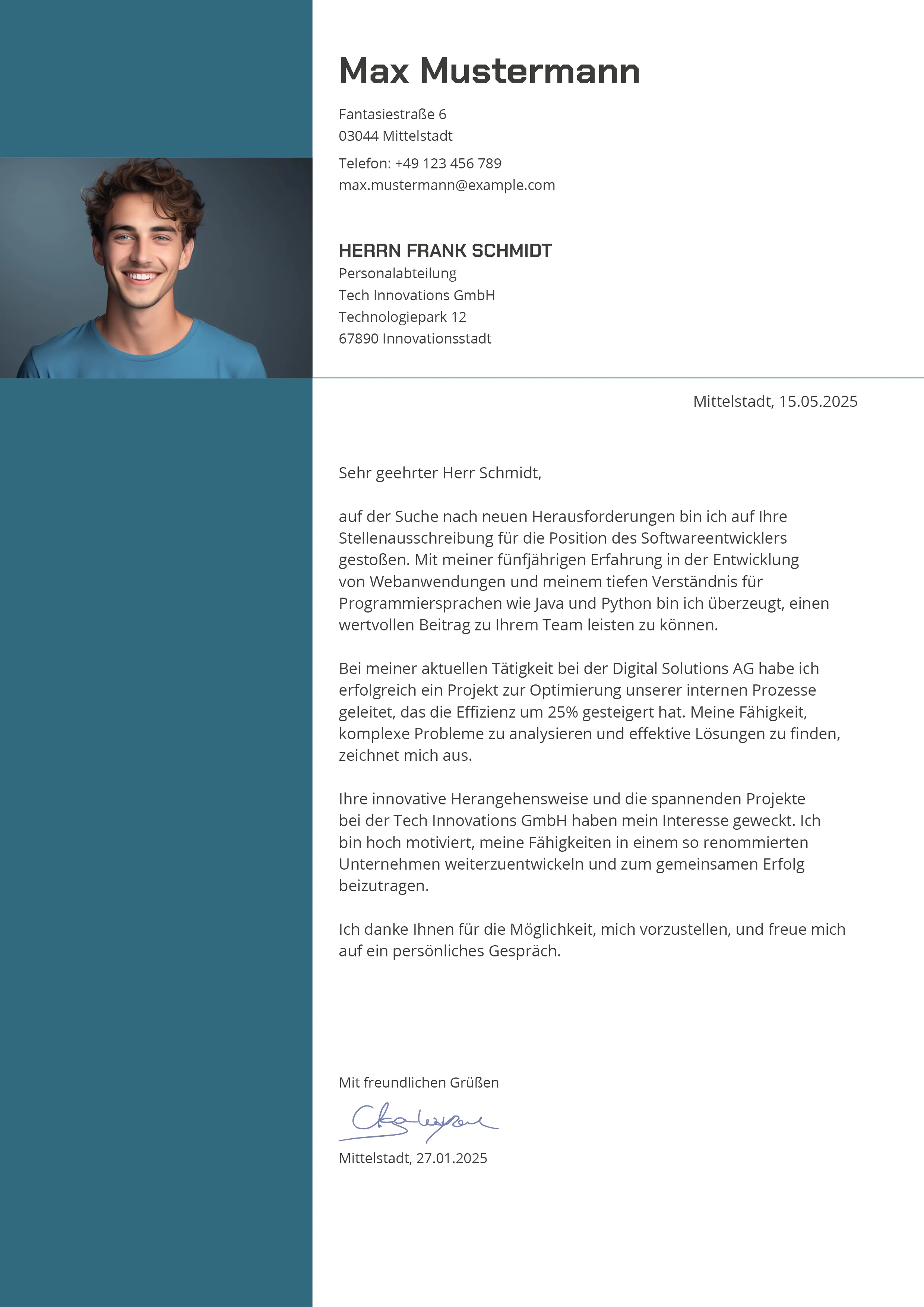Cover letter for your application: Avoid typical mistakes
Are you currently looking for your dream job and need to write a letter of motivation? Then you have come to the right place! A good letter of motivation can make a difference and set you apart from the competition. But don't worry, it doesn't always have to be long and complicated. Sometimes a short and concise application is enough to convince your counterpart.

In this post, we will show you some practical examples and give you tips on how to get to the point with your letter of motivation. Get comfortable, grab a coffee, and let's get started!
Table of Contents
What is a Letter of Motivation?
The letter of motivation is a central part of your application. It complements the cover letter and the resume by providing deeper insights into your personality, motivation, and suitability for the desired position. While the cover letter is usually more formal and establishes direct contact with the employer, the letter of motivation is about outlining your reasons and enthusiasm for the position and the company.
Definition and Purpose
A letter of motivation is a document that you attach to your resume and other application documents to explain your motivation and suitability for a particular position. It is often referred to as the "Third Page" or "Page Three" of the application. The purpose of the letter of motivation is to show the employer why you are the ideal candidate for the position and what sets you apart from other applicants.
Why is a Letter of Motivation Important?
- Personal Connection: In the letter of motivation, you can establish a personal connection to the company and the advertised position. You can express your enthusiasm and passion for the industry, the company, and the specific tasks.
- Highlighting Your Qualifications: Here, you have the opportunity to emphasize your key qualifications and experiences that qualify you well for the position. You can delve into achievements and projects that may only be briefly mentioned in the resume.
- Show Uniqueness: The letter of motivation provides space to showcase your personality and individual qualities. You can make it clear how you stand out from other applicants and why you fit well into the team and company culture.
- Explanation of Gaps: If there are gaps or inconsistencies in your resume, you can address and explain them in the letter of motivation. This can avoid misunderstandings and give the employer a more complete picture of you.
How Should a Letter of Motivation Be Structured?
A good letter of motivation typically consists of three parts:
- Introduction: Start with a strong introduction that captures the reader's interest. Briefly introduce yourself and explain why you are interested in the position.
- Main Body: In the main body, elaborate on your qualifications, experiences, and achievements. Explain why you are the perfect fit for the position and how you can contribute to the company's success.
- Conclusion: Close with a positive outlook. Thank them for the opportunity to introduce yourself and express your anticipation of a personal conversation. A polite farewell completes the letter.

The Structure of a Successful Letter of Motivation
A well-structured letter of motivation can make a difference in whether your application ends up in the stack of "Invitation for an Interview" or "Rejection." The right structure helps you convey your message clearly and convincingly. Here we show you how to structure your letter of motivation into Introduction, Main Body, and Conclusion, and what is important in each section.
Title
The title of your letter of motivation is the first impression the reader gets. It should immediately attract attention and make it clear what your letter is about. Here are some tips for formulating a convincing title:
- Concise and Clear: Keep the title short and concise. It should immediately indicate that it is a letter of motivation and for which position you are applying. Example: "Letter of Motivation for the Position of [Job Title] at [Company]."
- Personalization: If possible, personalize the title with the name of the company or specific department. Example: "Your New Marketing Expert: My Motivation for the Position at [Company]."
- Emphasize Motivation: Highlight your motivation or special qualifications that distinguish you for the position. Example: "With Passion for [Industry/Field]: Why I am the Ideal Candidate for [Job Title]."
- Avoiding Clichés: Avoid clichéd phrases. An original and authentic title will be more memorable. Example: Instead of "Applying for a position as...," try "Innovative Solutions for Your Team: My Motivation for the Role as [Job Title]."
Here are 10 creative and concise headlines for a letter of motivation:
- My Strengths for Your Company
- My Path to Your Team
- Why I Fit with You
- My Enthusiasm for [Company]
- Your Future [Job Title] Introduces Itself
- What I Bring to the Table
- My Contribution to Your Success
- That's Why I Want to Work for You
- My Vision for [Company]
- How I Enrich Your Team
These headlines are short, concise, and personalized to pique the reader's interest and leave a positive first impression.
A well-crafted headline sparks interest and makes the reader curious about the rest of your letter of motivation. Take the time to find the perfect headline - it's the first step to leaving a lasting impression.
Introduction
The introduction of your letter of motivation should immediately capture the reader's interest and encourage them to keep reading. Here are some tips on how to write a strong introduction:
- Personalized Start: Avoid standard phrases and begin with a personal connection to the position or the company. For example: "Since my youth, I have been passionate about innovative technologies, so I am particularly excited about the opportunity to apply at [Company]."
- Clear Objective: Directly state the position you are applying for and where you found the job posting. For example: "I read your job posting for [Job Title] on your website with great interest."
- Emphasize Motivation: Show in the introduction why the position appeals to you. For example: "The prospect of working in a leading company in the industry and contributing my skills in [relevant area] excites me greatly."
Main Body
The main body is the centerpiece of your letter of motivation. Here, you delve into your qualifications and experiences in detail, explaining why you are the perfect fit for the position.
- Relevant Qualifications: Focus on qualifications and experiences directly related to the advertised position. For example: "Through my role as [previous position] at [former company], I acquired solid knowledge in [relevant area]."
- Achievements and Projects: Highlight specific accomplishments and projects that support your suitability. For example: "In my last project, I successfully led a team of 10 people and increased efficiency by 20%."
- Soft Skills: Don't forget to mention your personal strengths and soft skills that are relevant to the position. For example: "My ability to keep a clear head and work in a solution-oriented manner even in stressful situations makes me a valuable team member."
- Company Reference: Demonstrate that you have researched the company and explain why you want to work there. For example: "The values of [Company], especially the focus on sustainability, resonate with me and align with my own beliefs."
Conclusion
The conclusion wraps up your letter of motivation and should leave a positive and lasting impression.
- Summary: Briefly summarize why you are ideally suited for the position. For example: "I am convinced that my qualifications and my passion for [relevant area] align perfectly with the requirements of the advertised position."
- Thanks and Outlook: Thank the reader for considering your application and express your anticipation for a personal interview. For example: "Thank you for the opportunity to introduce myself, and I look forward to learning more about the position and your company in a personal conversation."
- Polite Farewell: End your letter with a polite closing. For example: "Sincerely, [Your Name]."
Tips for a Compelling Letter of Motivation
A compelling letter of motivation can significantly improve your chances of getting an interview. Here are some proven tips to help you write a strong and convincing letter of motivation:
1. Show Individuality
Every company and position is unique, and your letter of motivation should reflect that. Avoid generic templates and always tailor your letter to each position and company. Show that you have researched the company and its culture.
2. Be Clear and Concise
Avoid long and convoluted sentences. A good letter of motivation is clear and concise. Focus on making your main points clearly, without unnecessary tangents. A structured layout with paragraphs and subheadings can help make your writing easy to read.
3. Use Concrete Examples
Instead of just making general statements about your skills and experiences, use concrete examples to support your statements. Describe specific situations in which you have successfully used your skills and explain how these experiences prepare you for the advertised position.
4. Use Positive Language
Use a positive and confident language to convey your enthusiasm and commitment. Avoid negative formulations and focus on what you have achieved and how you can contribute to the company's success.
5. Highlight Relevant Qualifications
Address specifically the qualifications and experiences that are particularly important for the position. Read the job description carefully and highlight those aspects of your profile that best fit the requirements. Avoid mentioning unnecessary information that is not directly relevant.
6. Stay Authentic
Be honest and authentic in your cover letter. Exaggerations or untrue statements can lead to problems later on. Show your genuine motivation and passion for the position and the company.
7. Professional Layout
An appealing and professional layout is also important. Use a clear font, enough paragraphs, and a well-structured format. Make sure that your cover letter is free of spelling and grammar errors. A neat formatting leaves a good first impression.
8. Formulate a Strong Conclusion
The conclusion of your cover letter should leave a positive and lasting impression. Thank the recipient for considering your application and express your anticipation for a personal interview. A polite farewell rounds off your letter.
Examples of Short and Concise Cover Letters
A short and concise cover letter can be just as effective as a longer one. The key is to clearly and convincingly present your most important qualifications and motivations. Here are some examples that can serve as inspiration:
Cover Letter for the Position of Marketing Manager at [Company]
Dear Mrs. Müller,
With great enthusiasm, I read your job posting for the position of Marketing Manager. For over five years, I have been working successfully in the field of marketing, gaining extensive experience in the development and implementation of marketing strategies.
In my current position at [current company], I have increased the reach of our digital campaigns by 30% and significantly contributed to brand awareness. My creativity and analytical thinking have helped me develop innovative solutions that have had a significant impact on our sales figures.
What particularly attracts me to your advertised position is the opportunity to work in a dynamic team and explore new avenues in marketing. The values and visions of [Company] align perfectly with my ideas of successful marketing.
I look forward to learning more about the position and your company in a personal conversation. Thank you for considering my application.
Best regards,
[Your Name]
Cover Letter for the Position of Software Developer
Dear Mr. Schmidt,
In search of new challenges, I came across your job posting for the position of Software Developer. With my five years of experience in developing web applications and my deep understanding of programming languages such as Java and Python, I am confident in being able to make a valuable contribution to your team.
In my current role at [current company], I successfully led a project to optimize our internal processes, increasing efficiency by 25%. My ability to analyze complex problems and find effective solutions sets me apart.
Your innovative approach and exciting projects at [Company] have caught my interest. I am highly motivated to further develop my skills in such a renowned company and contribute to our mutual success.
I thank you for the opportunity to present myself and look forward to a personal conversation.
Best regards,
[Your Name]

Cover Letter for the Position of Graphic Designer at [Company]
Dear Ms. Weber,
Upon reading your advertisement for the position of graphic designer, I knew: This is exactly the challenge I am looking for. My passion for creative design and my three years of experience in designing visual content make me an ideal candidate for this position.
In my current position at [current company], I have successfully implemented several marketing campaigns visually and significantly developed the corporate design. My eye for detail and my sense for current design trends have contributed to our projects being well received.
What particularly fascinates me about your role is the opportunity to work in a creative environment and contribute my ideas to exciting projects. The innovative direction of [Company] is very appealing to me and aligns with my professional goals.
I look forward to the opportunity to learn more about the position and your company. Thank you for your time and consideration.
Yours sincerely,
[Your Name]
Cover Letter for a Degree Program
Dear Sir or Madam,
With great enthusiasm, I learned about the opportunity to study the Bachelor's program in [Major] at your prestigious university in the upcoming semester. Since my school years, I have had a passionate interest in [relevant field], which is reflected in my grades and extracurricular activities.
During my school years, I gained valuable experience in various projects and internships, including at [Company/Institution]. These experiences have reinforced my desire to deepen my knowledge in [Major] and engage intensively with the theoretical and practical aspects of this fascinating field.
What appeals to me about your university is the practice-oriented education and the opportunity to learn and grow in an international environment. The excellent equipment of your labs and the renowned faculty are further reasons why I have chosen your study program.
I am convinced that with my high motivation, analytical thinking, and passion for [Major], I can make a valuable contribution to your university. I am eager to further develop my skills and knowledge and look forward to benefiting from the top-class professors and diverse study opportunities.
Thank you for considering my application, and I am looking forward to the opportunity to introduce myself in a personal interview.
Yours sincerely,
[Your Name]
Cover Letter for a Scholarship
Dear Sir or Madam,
I am applying for a scholarship from [Scholarship Provider] for the [Major] program at [University]. As a dedicated and goal-oriented student, I am convinced that your support will help me achieve my academic and professional goals.
In my academic career so far, I have demonstrated excellent performance and strong commitment in various projects and initiatives. For example, I have been involved in [Project/Initiative], where I gained important practical experience and valuable insights into [relevant field].
The financial support from your scholarship would allow me to fully focus on my studies and acquire additional qualifications to broaden my career prospects. Moreover, it would facilitate my participation in international conferences and exchange programs, which are of great value for my personal and academic development.
I am confident that with my determined and committed work ethic, I can make a positive contribution to the community of scholarship recipients. I am excited to further develop my skills and make the most of the opportunities your scholarship provides.
Thank you for considering my application. I look forward to a positive response and am available for any further questions.
Yours sincerely,
[Your Name]
Cover Letter for a Semester Abroad
Dear Sir or Madam,
With great enthusiasm, I hereby apply for a semester abroad at [Partner University] as part of my studies in [Major] at [Home University]. A semester abroad represents a unique opportunity for me to enhance my professional and intercultural skills.
My decision to choose [Partner University] is based on its excellent reputation in the field of [relevant field] and the diverse study programs that perfectly match my academic interests and goals. In particular, the modules [specific modules] and the innovative research projects have piqued my interest.
During my previous studies, I have already acquired solid knowledge in [relevant fields] and gained practical experience in various projects such as [sample project]. A semester abroad would allow me to further deepen my knowledge, gain new perspectives, and improve my language skills.
In addition, I am looking forward to getting to know the culture and way of life of the host country and to establish international contacts that will be of great value for my personal and professional future. I am convinced that with my openness and adaptability, I can make a positive contribution to the community of exchange students.
Thank you for considering my application, and I look forward to the opportunity to explain in more detail my motivation and suitability in a personal interview.
Yours sincerely,
[Your Name]
Common Mistakes and How to Avoid Them
A motivational letter is your chance to make a lasting impression. However, even small mistakes can tarnish the positive overall impression. Here are some common mistakes and tips on how to avoid them:
1. Boring Introductions
A common mistake is a boring and generic introduction like "I have read your job advertisement with great interest." This phrase is often used and does not leave a lasting impression. Instead, you should be creative and unique:
- Instead: "The opportunity to work as a graphic designer at [Company] immediately piqued my creative interest."
- Alternative: "Your job posting for the position of Marketing Manager has sparked my enthusiasm, and I can't wait to bring my ideas to your team."
2. Lack of Individuality
Many applicants use standard templates and barely tailor them to the specific position or company. This shows a lack of interest and preparation.
- Avoid: Use individual examples and address the specific requirements of the job posting. Research the company and mention specific projects or values that appeal to you.
3. Too Much Focus on Oneself
Another common issue is that applicants focus too much on themselves and their own needs, rather than emphasizing the added value for the company.
- Instead: "With my experience in project management, I can help streamline your internal processes and reduce project durations."
- Alternative: "I look forward to bringing my creative ideas and my passion for design to your team, and together, realize innovative projects."
4. No Concrete Examples
General statements like "I am a good team player" or "I am very motivated" are unconvincing if not backed up by concrete examples.
- Avoid: "In my last project, I successfully led a team of 10 people and increased efficiency by 20%."
- Alternative: "In my previous role at [Former Company], I increased the reach of our campaigns by 30% through creative marketing strategies."
5. Spelling and Grammar Errors
Nothing leaves a worse impression than a motivational letter full of spelling and grammar errors. It shows a lack of care and professionalism.
- Avoid: Proofread your motivational letter carefully, use spell checks, and have it reviewed by another person.
- Alternative: Invest time in a thorough review and optimize your writing to leave a professional impression.
6. Too Long Text
An overly long motivational letter can overwhelm the reader and dilute important information.
- Avoid: Keep your writing concise and to the point. Focus on the key points and avoid unnecessary digressions.
- Alternative: Structured paragraphs and clear, concise sentences help make your writing clear and reader-friendly.
7. Missing Closing Formula
An incomplete or unclear conclusion can weaken the positive overall impression of your motivational letter.
- Avoid: "I hope to hear from you."
- Instead: "Thank you for the opportunity to introduce myself, and I look forward to learning more about the position and your company in a personal conversation."
- Alternative: "With great anticipation for a personal conversation, I remain sincerely."
